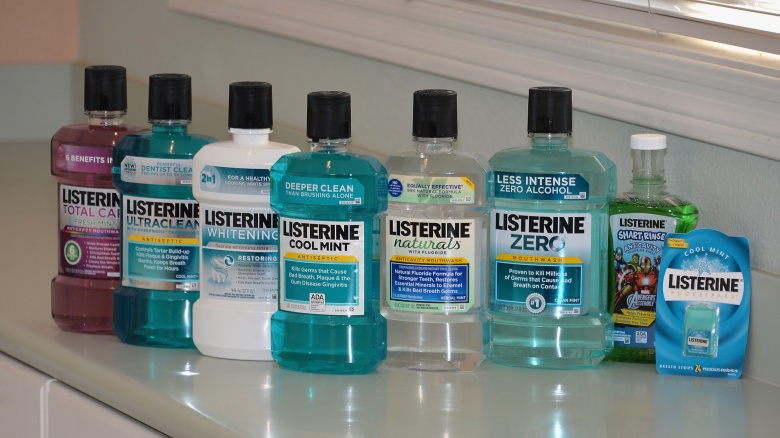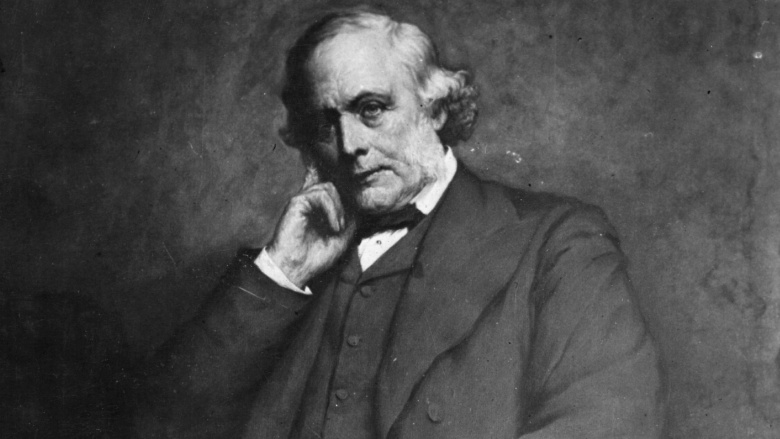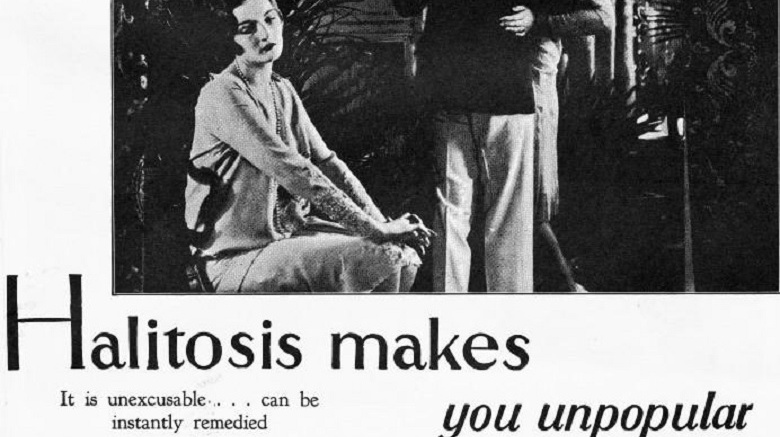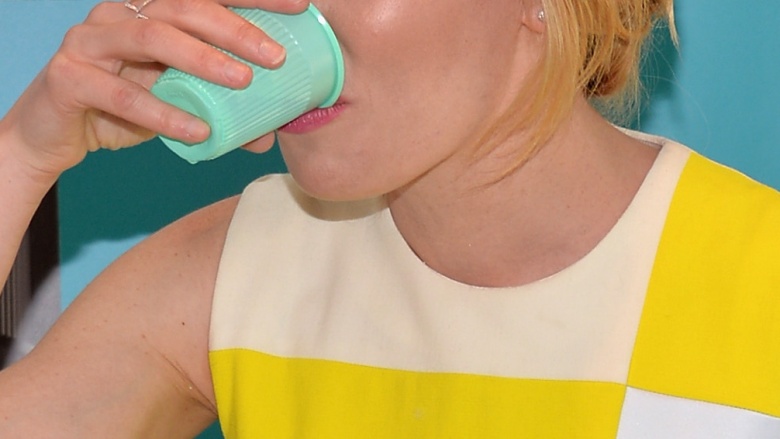The Untold Truth Of Listerine
Go to your bathroom. You're already in there? Rock on! Check out your medicine cabinet. What's some of the stuff you have — toothpaste, hairbrush, rubbing alcohol, drinking alcohol, Listerine mouthwash? Okay, take the Listerine out. We want you to think about it ... what is it? What is it really?
Or, don't worry about thinking. We've got the answers right here, for you, because we're just that nice.
What exactly is Listerine?
For the five of you out there who don't use Listerine nightly, let us just say — shame on you! (Don't worry, by the end of this, you'll be going, "Wait a minute, why did they shame us!" and the answer is: just because.)
Listerine is a common household product, found next to your toothbrush and toothpaste. It's a mouthwash so you, ya know, swirl it around your mouth and spit. It helps keep your mouth clean and your breath fresh. That's what Listerine is and what it does and has done forever.
Kidding. Would we have an article if that were true? It's actually ... a floor cleaner. Really. Listerine was first sold as not only a floor cleaner, but also a treatment for gonorrhea. But that's still not the beginning.
The story of good Dr. Lister
Back in the stone-age of medicine (the late-1800s), there was a doctor named Joseph Lister who slowly discovered that, hey, washing your hands might actually be a good idea. Before him, doctors rarely washed their hands before surgery, believing that infections came from the smelly air, as opposed to vice-versa. As a result, Lister observed that "45 to 50 percent" of his patients died of sepsis after being amputated. He later discovered that if he washed his tools (and hands) in carbolic acid, his patients were less likely to die.
After making his discovery about the value of cleaning stuff, he discovered Louis Pasteur's theory of evil microorganisms plaguing all mankind. Combining these things, Doctor Lister realized that germs — an idea most doctors back then rejected like doctors today reject leeching — are real and terrifying demon-monsters that plague our daily life. This revelation, plus the washing-up stuff, helped revolutionized the usage of antiseptics in doctoring.
So, how does that tie in to Listerine? Well ...
The birth of Listerine
You probably already caught this, but Lister and Listerine have some letters in common. Most of them, actually. That's not a coincidence.
See, Jordan Wheat Lambert was a chemist and businessman who decided to make a surgical antiseptic. In order to honor Doctor Lister (and, most likely, get some free publicity off the name similarities), Lambert named his antiseptic "Listerine." Of course, there's not a lot of money to be made in surgical antiseptics, so Lambert and his associate, Dr. Joseph Lawrence, marketed it for a ton of different stuff — including curing dandruff and functioning as aftershave, along with the aforementioned floor-cleaner and STD-treater gimmicks. However, even that wasn't enough for their money-hungry wide-eyes. Something else needed to happen, something that would take Listerine from the micro-market to a household product.
From floor cleaner to fresh breath
Years later, once Lambert's son, Jerry, took over the family business, it became clear that Listerine wasn't selling well enough in its many current iterations. Something else needed to be made up — something that sounded terrifying, something that needed treatment stat!
Introducing ... halitosis. That's right. Bad breath certainly exists, but the idea that it's this scourge of polite society that must be eradicated before you can even hope to date is nothing but the creation of fear-mongering advertisers. In fact, the term used to refer to advertisers inventing something to fear so you'll buy their stuff is called "the halitosis appeal." It happens a lot, too. Almost everything you dislike about your body (acne, potbelly, receding hairline, double-chin, dry skin) are things you didn't know were bad until advertisers — who had a product to sell — told you they were bad. But spend just $19.95 a month and boom: your feet calluses/bad breath/burger belly will be gone!
So what IS halitosis?
Basically, "halitosis" is a mashup of two Latin words. Do you know what they are? Neither did people in the '30s! Halitus is Latin for "breath", while osis is Latin for "disease." In short, it means "bad breath" and little more. Does "bad breath" sound as scary as "halitosis?" Of course not! Bad breath is just a troublesome thing, solved with a mint, while halitosis is as scary as gingivitis or hepatitis, a mysterious doom-ailment that's keeping you from being your very best. Using the scare-word "halitosis," the makers of Listerine got their product in the hands, desks, and bathrooms of everyone in America.
So next time you reach for that bottle of mouthwash, just remember — your grandparents used it to treat gonorrhea. And it doesn't really do anything that a stick of gum can't do. You've been lied to you whole life. Cheers! And good breath for all.





